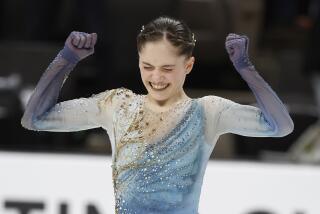Ando skates to world title
- Share via
TOKYO — The noise washed over reigning world champion Kimmie Meissner as she took the ice for her four-minute performance Saturday. She skated immediately after Japan’s Mao Asada, the darling of the home fans, and the crowd reaction told Meissner how well Asada had done in the women’s final at the world championships.
“I tuned out the scores, but I couldn’t tune out the screams,” Meissner said.
She may find another sound ringing in her ears for the next few years: The notes of “Kimigayo,” the Japanese national anthem and new theme song of women’s skating.
It has been played to honor the women’s winner at two of the last four world championships and the 2006 Olympics.
“I think we are building a dynasty,” Japanese figure skating federation official Tatsuro Matsumura said when Shizuka Arakawa became the first Olympic champion from Japan.
Rising even faster than expected, the dynasty took near total dominion over the women’s event as the 2007 world meet ended Saturday.
Miki Ando became Japan’s fourth world champion. Asada placed second, giving Japan two medals in the same world championships for the first time. Kim Yu-Na of South Korea was third, winning her country’s first world figure skating medal and creating an all-Asian podium for the first time in any of the sport’s four disciplines.
Another Japanese, Yukari Nakano, was fifth. The other U.S. skaters, Emily Hughes and Alissa Czisny, were ninth and 15th.
“Asian skaters are starting to become the top skaters in the world, and I am happy about that,” Ando said. “There are many wonderful Japanese skaters, and we were able to prove our strength by winning the top two medals.”
They pushed Meissner into fourth, leaving U.S. women without a medal at the world championships for the first time since 1994. Meissner had the further ignominy of being only the second world champion to not earn a medal the following year during the post-compulsory figure skating era.
Meissner may find some consolation in noting that the other world champion who tumbled similarly was Arakawa, who went from first in 2004 to ninth in 2005 and then won the Olympic title in 2006 before retiring from competition.
The crowd in front of Meissner now apparently isn’t going away any time soon. Ando is 19, Asada and Kim each 16.
With a fourth in the short program, a third in the free skate and a total score of 180.23 points, Meissner was in a different world from Ando (195.09) and Asada (194.45). Kim (186.14), the short-program winner, was on her way to the title until she ran out of energy in the final two minutes of the free skate and fell on two triple lutz jumps.
Meissner, 17, was erratic all season, unable to do two clean programs in any competition. She has given everyone plenty of reasons to wonder if her 2006 world title was a fluke.
“I know I have to do it again, but I’ll always be a world champion,” Meissner said. “I’m still growing up, and I still have a lot to learn. I think I’ve got a couple more years in me. I’ll be back.”
Meissner said she used this post-Olympic season to experiment on the road to the 2010 Winter Games. That meant trying different skating styles, looking for one that will allow her to impress judges.
“It’s a good time to do it,” she said.
She also must try to figure out why her most crucial jump, the triple lutz, deserted her most of the season. As she had done while beating a weak field at the U.S. championships, Meissner botched the landing of her first lutz in Saturday’s free skate, all but ruining her medal chances.
“On a scale of 1 to 10, this season was a 7 or 8,” Meissner said.
Ando was criticized by the Japanese media when she faltered at the 2006 Olympics, especially after being selected to the team because of her commercial popularity in Japan despite a sixth at the national championships. She vowed this year to be “the Miki without mistakes.”
All went according to plan until she embarrassed herself to tears by reducing four planned triple jumps to singles in December’s Grand Prix final.
“I knew the reason that happened,” Ando said. “That is why I was able to adjust and improve in such a short time.”
Ando did seven triple jumps, two in combination, during a free skate Saturday. She was second in the free skate, but her program component -- or presentation -- scores ranked only fourth.
Asada won the free skate and had she not botched the easiest triple jump, the toe loop, she would have made up all the points lost to Ando in the short program because of a huge mistake on a much more difficult jump combination.
“I knew Mao had a personal best [in the free skate], so it made me nervous,” said Ando, who skated last in the final.
Kim, the revelation of these championships, may have been undone by a back injury diagnosed in January as a bulging disk.
--
Philip Hersh covers Olympic sports for The Times and the Chicago Tribune.
More to Read
Go beyond the scoreboard
Get the latest on L.A.'s teams in the daily Sports Report newsletter.
You may occasionally receive promotional content from the Los Angeles Times.






